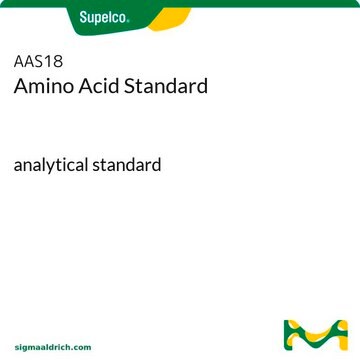23182
(+)-1-(9-Fluorenyl)ethyl chloroformate solution
≥18 mM in acetone, for chiral derivatization, LiChropur™
Synonym(s):
(+)-FLEC solution
Sign Into View Organizational & Contract Pricing
All Photos(1)
About This Item
Empirical Formula (Hill Notation):
C16H13ClO2
CAS Number:
Molecular Weight:
272.73
MDL number:
UNSPSC Code:
12000000
PubChem Substance ID:
NACRES:
NA.22
Recommended Products
grade
for chiral derivatization
Quality Level
product line
ChiraSelect™
optical purity
enantiomeric ratio: ≥99.0:1.0 (HPLC)
quality
LiChropur™
concentration
≥18 mM in acetone
technique(s)
HPLC: suitable
refractive index
n20/D 1.359
storage temp.
2-8°C
InChI
1S/C16H13ClO2/c1-10(19-16(17)18)15-13-8-4-2-6-11(13)12-7-3-5-9-14(12)15/h2-10,15H,1H3
InChI key
SFRVOKMRHPQYGE-UHFFFAOYSA-N
Looking for similar products? Visit Product Comparison Guide
Related Categories
General description
(+)-1-(9-Fluorenyl)ethyl chloroformate [(+)-FLEC] is a chiral derivatizing reagent. It helps in separating enantiomers of α-amino acids, as well as helps in determining its optical purity using HPLC method.
Application
(+)-FLEC may be used in enantioselective analysis of glufosinate using reversed-phase high-performance liquid chromatography system coupled with a fluorescence detection system.
Physical form
solution, 5 mg in 1 mL acetone
Other Notes
Chiral derivatizing agent for primary and secondary amino acids and amines. The derivatives are separated by reversed-phase LC with fluorescence detection for determining the enantiomeric purity
Legal Information
ChiraSelect is a trademark of Sigma-Aldrich Co. LLC
LiChropur is a trademark of Merck KGaA, Darmstadt, Germany
Signal Word
Danger
Hazard Statements
Precautionary Statements
Hazard Classifications
Eye Irrit. 2 - Flam. Liq. 2 - STOT SE 3
Target Organs
Central nervous system
Supplementary Hazards
Storage Class Code
3 - Flammable liquids
WGK
WGK 2
Flash Point(F)
1.4 °F
Flash Point(C)
-17 °C
Choose from one of the most recent versions:
Already Own This Product?
Find documentation for the products that you have recently purchased in the Document Library.
Zeineb Aturki et al.
Electrophoresis, 25(4-5), 607-614 (2004-02-26)
The indirect resolution of five beta-adrenoreceptor blocking agents (propranolol, oxprenolol, pindolol, metoprolol, and atenolol) using precolumn derivatization with (+)-1-(9-fluorenyl)ethyl chloroformate (FLEC), and capillary electrochromatography (CEC) is reported. Three octadecylsilanized (ODS) silica gel-based stationary phases, differing in particle diameter and carbon
A Roux et al.
Journal of chromatography, 570(2), 453-461 (1991-10-04)
A method for the determination of the R-(+) and S-(-) enantiomers of propranolol in blood was developed. After extraction with heptane-isopentanol and derivatization with (+)-1-(9-fluorenyl)ethyl chloroformate, excess reagent was removed using solid-phase extraction. The enantiomers were separated on an achiral
Sascha Freimüller et al.
Journal of pharmaceutical and biomedical analysis, 30(2), 209-218 (2002-08-23)
An indirect enantioseparation method for robust and precise determination of D-Carnitine (D-C) in L-Carnitine (L-C) in the range of 0.1-1.0% is presented. The method is based on derivatization of Carnitine with (+)-[1-(9-fluorenyl)-ethyl]-chloroformate ((+)-FLEC). The two diastereomers are subsequently separated of
Michelle A Camerino et al.
Organic & biomolecular chemistry, 11(16), 2571-2573 (2013-03-14)
An efficient synthesis of the enantiomers of fluorenylethylchloroformate (FLEC) has been achieved that allows the routine application of the reagent for the resolution of chiral amines including unusual amino acids. The utility of the fluorenylethoxycarbonyl (Feoc) group as a chiral
N Todoroki et al.
Journal of chromatography. B, Biomedical sciences and applications, 728(1), 41-47 (1999-06-24)
The natural occurrence of N-methyl-D-aspartate (NMDA) is limited to the foot muscle of Scapharca broughtonii; it is a well known compound for its neuroexitatory activity. This paper describes a high-performance liquid chromatographic (HPLC) method for the determination of NMDA in
Our team of scientists has experience in all areas of research including Life Science, Material Science, Chemical Synthesis, Chromatography, Analytical and many others.
Contact Technical Service








